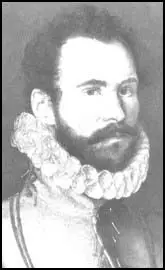
Sir Martin Frobisher was an eminent mariner during the reign of Elizabeth I. Frobisher, along with the likes of Raleigh, Hawkins and Drake gained for England a reputation for naval supremacy. Though Drake may have cemented his historical legacy with his involvement in the Spanish Armada in 1588, Frobisher was one of the chief commanders of the English Navy and also fought against the Spanish in this English victory.
Martin Frobisher was born around 1539, the son of Sir Bernard Frobisher. He was educated in the household of his uncle, Sir John York, who was a merchant in the City of London and also the Master of the Mint. Many merchants made their fortune by engaging in overseas trade and it would have been odd given his education if Frobisher had not shown any interest in what lay beyond England’s shores.
Frobisher crewed a number of voyages to African coast in the 1550’s. In the 1560’s and 1570’s he was employed by the likes of Louis, Prince of Condé and William the Silent to fight for the Protestants in the Revolt of the Spanish Netherlands.
After this, Frobisher took part in less violent exploits. He made three voyages to find the North-West Passage that were financed by Elizabeth and city financiers. In the first of these three journeys (June to October 1576) he found what is now called the Frobisher Strait. He returned to England with black rocks that were thought to contain gold. In his second voyage (May to September 1577) he returned with 200 tons of this black rock that was eventually to be used for road repairs in Kent. His third voyage was from May to October 1578. He visited Greenland and returned with some iron nails, which he found there and indicated that other European sailors had got to Greenland before an English one.
Disillusioned with failing to find anything of value – which would have been the prime motivating factor then – Frobisher returned to military action between 1579 and 1580. He was a shrewd leader of men and many considered him to be a masterful commander. However, along with the commercial failure of his three voyages, Frobisher was also aggrieved that others, especially Drake and Raleigh, gained more recognition than him at court. Frobisher was given the command of ‘Primrose’ on Drake’s attacks on the West Indies between September 1585 and July 1586. He served as a Vice-Admiral.
In 1587, Frobisher was given the command of the Channel fleet and during the Spanish Armada in 1588 he commanded the ‘Triumph’ and led one of the four naval squadrons under Lord Howard of Effingham. Frobisher was knighted as a result of his leadership during the Armada.
Between 1589 and 1592, Frobisher made three expeditions to the Azores and captured a number of valuable Spanish ships. In 1594, he commanded a force sent to aid the Huguenots at Brest. In November 1594 Frobisher was wounded during at attack at nearby Crozon; he died on November 15th and was buried on November 22nd in Plymouth, Devon.